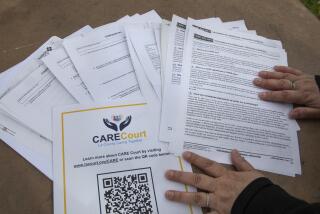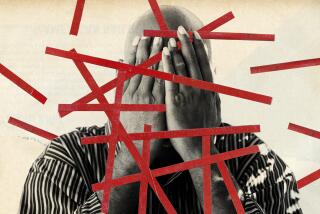Law Is Impediment to Mental Health Care
- Share via
For 32 years, the mentally ill and their families have suffered innumerable hardships because of the Lanternam-Petris-Short Act, the landmark state law that granted broad civil rights to the mentally ill.
I know firsthand because I have a younger sister who developed schizophrenia in her late teens. She’s 44 now. She was combative from the beginning and has been incapable of sustaining a healthy relationship even within her peer group.
My sister has been lonely and angry for 25 years. It has been heartbreaking to watch, and anyone who has experienced loneliness knows that the real pain is hers to endure--day after endless day.
State Senate President Pro Tem John Burton (D-San Francisco), who opposes attempts to expand involuntary treatment of mentally ill people, has called for a study of the issue. He has argued that the seriously mentally ill are being harmed not by the law but by inadequate funding of community health programs. Burton needs to understand that even if we had money for these facilities, it would not necessarily translate into patients receiving the care they need.
Most people suffering from schizophrenia do not take their medication without supervision. My sister, for example, believes that there is no need for medication and that everyone else is just jealous of her. When asked why, she becomes enraged and violent.
Once, 21 years ago, she admitted herself to a hospital and her medication was monitored. After three weeks, she was becoming herself again, a highly intelligent, kind and beautiful person.
I have not seen my real sister since then.
Hers is not an isolated case. In fact, mental health professionals would tell you that cases like hers are quite common.
Judgment calls, when a person’s entire life depends on the judgment, should be made only by those who truly know the field being judged. Our society, while not close to perfect, does have agencies that do this: Police uphold laws, lawyers litigate and defend, dental and medical professionals care for our bodies, judges hand out judgments. Why, then, is it not up to mental health professionals to determine if a patient needs supervised care?
*
Without this expert involvement and enforcement, there is absolutely no time for medication to build up in a patient’s system and no real chance for the patient ever to live a more fulfilling life. The current system may realize a few successes if the patients are suffering from bipolar and anxiety disorders, but many more people suffer from a combination of disorders, and they do require monitoring.
There is nothing that we as a family, and the doctors, can do to help my sister and the thousands of others who are suffering across the country. My sister is combative with family, acquaintances and mental health professionals, but she does not fit the criteria of eminent danger to herself and others. Under Lanterman-Petris-Short, doctors are essentially prohibited from treating or medicating her against her wishes without a finding of eminent danger. But over the years, there has been a lot of what I would term eminent danger: physically threatening family members with knives, physical assaults on family and a police officer, rages that result in destruction of her personal property and that of others. Yet not once during the past 25 years have we had any legal ground to obligate her for treatment.
My parents lived in sorrow and fear for their youngest child. They died without being able to get her the help she needs. Even the late Assemblyman Frank Lanterman realized, after observing the unintended effects of the legislation he sponsored, that this law had come to “prevent those who need care from receiving it.”
This is a cruel law. Mental health care professionals dislike it because it makes it extremely difficult for them to make progress with a patient. Families sit and wonder, night after night, if their loved one is walking the streets, dead or alive.
Cleaning up this mess should not be a bipartisan issue.
We must not only support new legislation, we must also remove the Lanterman-Petris-Short Act entirely. Replace it with a law that gives authority where it belongs, to mental health care professionals.


